- Home
- »
- Advanced Interior Materials
- »
-
Basalt Fiber Market Size, Share And Growth Report, 2030GVR Report cover
![Basalt Fiber Market Size, Share & Trends Report]()
Basalt Fiber Market (2024 - 2030) Size, Share & Trends Analysis Report By Usage (Composite, Non-Composite), By End-use (Building & Construction, Marine), By Region, And Segment Forecasts
- Report ID: GVR-4-68040-253-5
- Number of Report Pages: 80
- Format: PDF
- Historical Range: 2018 - 2022
- Forecast Period: 2024 - 2030
- Industry: Advanced Materials
- Report Summary
- Table of Contents
- Segmentation
- Methodology
- Download FREE Sample
-
Download Sample Report
Basalt Fiber Market Summary
The global basalt fiber market size was estimated at USD 284.1 million in 2023 and is projected to reach USD 593.9 million by 2030, growing at a CAGR of 11.2% from 2024 to 2030. The market is expected to grow at a significant rate, driven by increasing demand from automotive & transportation, building & construction, wind energy, and electrical & electronics industries.
Key Market Trends & Insights
- The Asia Pacific basalt fiber market accounted for the largest revenue share of more than 50.0% in 2023.
- The basalt fiber market in India is witnessing steady growth and is amongst the fastest-growing economies in the APAC.
- Based on usage, the composite segment accounted for the largest revenue share of over 58.0% in 2023.
- By end use, the building & construction segment accounted for the maximum revenue share of over 34.0% in 2023.
Market Size & Forecast
- 2023 Market Size: USD 284.1 million
- 2030 Projected Market Size: USD 593.9 million
- CAGR (2024-2030): 11.2%
- Asia Pacific: Largest market in 2023
Basalt fibers have several properties that make them attractive to these industries, including exceptional thermal stability, heat and sound insulation, vibration resistance, and overall durability. It is also non-corrosive and recyclable. Growing demand for environmentally friendly and sustainable materials is another factor that is expected to drive the growth of the basalt fiber market.
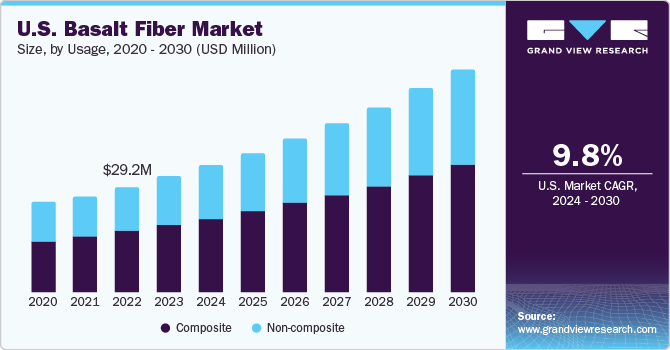
Increasing emphasis on sustainability and environmental consciousness has led industries to seek alternative materials with lower carbon footprints. Basalt fiber, derived from natural volcanic rock, aligns well with these sustainability goals, making it an attractive choice for various applications such as construction, automotive, and aerospace. It is driving market growth in the U.S. However, despite these advantages, the market faces certain restraints. One challenge is the high initial investment required for setting up basalt fiber production facilities. In addition, a lack of awareness among end-users about the benefits of basalt fibers compared to traditional materials presents a barrier to market growth. As technological advancements continue to improve the production process and expand the range of applications, basalt fibers are poised to emerge as a preferred choice over competitors.
Market Concentration & Characteristics
The market concentration is currently at a medium level and growing at an accelerating pace. Increasing demand for basalt fiber stems from its rising adoption in electrical & electronic applications, driven by a growing emphasis on renewable energy. Despite this growth, there is a relatively low level of merger & acquisition activities among major players due to high concentration within the market. However, there is a noticeable trend towards partnerships and collaborations among emerging companies, aimed at leveraging each other's strengths to achieve common objectives. This collaborative approach is to maintain market share in a highly competitive and expanding market landscape.
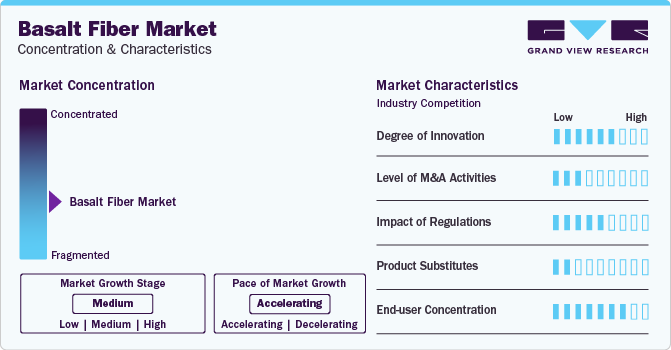
Regulatory standards governing basalt fiber production significantly impact the market growth, while its widespread usage in the electrical & electronics and automotive & transportation sectors, with no direct substitutes, mitigates the threat of substitution. End-user concentration within specific industries, such as electrical appliances, circuit boards, microwaves, and solar and alternative energy, remains high, indicating a persistent demand for basalt fiber in these sectors.
Usage Insights
The composite segment accounted for the largest revenue share of over 58.0% in 2023 and is anticipated to grow at a significant pace from 2024 to 2030. In composite applications, basalt fiber serves as a reinforcement material in the production of composite structures, offering exceptional strength, durability, and corrosion resistance. Its widespread usage in composite manufacturing, particularly in sectors, such as automotive, aerospace, construction, and marine, highlights its versatility and reliability in enhancing structural integrity while minimizing weight.
In non-composite applications, basalt fibers find utility in various forms, such as fabrics, yarns, and tapes, serving as insulation, filtration, and reinforcement, components across industries like textiles, insulation, and filtration. Its dual functionality across composite and non-composite domains highlights its adaptability and significance in meeting multifaceted industrial requirements.
End-use Insights
The building & construction segment accounted for the maximum revenue share of over 34.0% in 2023. High product adoption in the manufacturing of concrete, which is lightweight, environmentally friendly, and provides similar strength to that of steel, is driving segment growth. Growing infrastructure, construction & buildings sectors across the globe are further boosting the demand for lightweight concrete and this is anticipated to benefit the market over the forecast period.
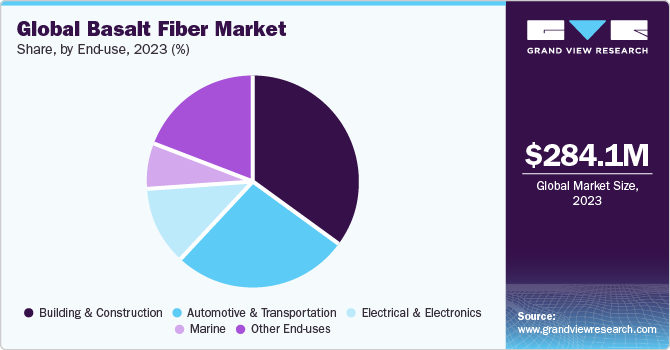
A surge in electric vehicles (EVs) and the digitalization of industries has led to the utilization of basalt fiber in the electrical & electronics and automotive sectors. This trend has prompted a wave of activity among basalt fiber producers, leading to expansions in production capacities and the establishment of new manufacturing facilities. Basalt fiber-reinforced composites are increasingly utilized in automotive manufacturing for components, such as body panels, interior trim, chassis reinforcements, and structural elements. Its unique properties help reduce the overall weight of vehicles making it an attractive application.
Regional Insights
The basalt fiber market in North America will have significant growth. Rising infrastructure investments in North America are driving demand for next-generation, sustainable construction materials like basalt fiber. Basalt fiber is an eco-friendly, naturally sourced material with high purity. Its manufacturing process is different from traditional fibers, as it does not produce harmful emissions. All of these factors make it a unique material and present lucrative growth opportunities for basalt fiber companies operating in the region.
U.S. Basalt Fiber Market Trends
The U.S. basalt fiber market is anticipated to grow at a CAGR of 9.8% over the forecast period. Growing demand for basalt fiber in the country can be attributed to factors such as superior mechanical properties, including its high strength-to-weight ratio and resistance to corrosive substances, and meet performance requirements of diverse industries. As awareness of these benefits continues to spread and technological advancements lead to the lowering of production costs, demand for basalt fiber is expected to rise steadily, further fueling its market growth.
Europe Basalt Fiber Market Trends
The basalt fiber market in Europe is anticipated to grow at a significant pace owing to eco-conscious construction and infrastructure projects demanding lightweight, non-corrosive materials, making basalt fiber a compelling choice.
The Germany Basalt fiber market reflects a dynamic landscape driven by the country's strong industrial base and emphasis on innovation. German industries, particularly automotive, construction, and engineering, demonstrate a growing preference for basalt fiber due to its superior mechanical properties and environmental benefits.
The basalt fiber market in France exhibits steady growth supported by its focus on renewable energy, infrastructure modernization, and sustainable manufacturing practices. French government's initiatives promoting clean energy and investments in research and development further bolster the market growth.
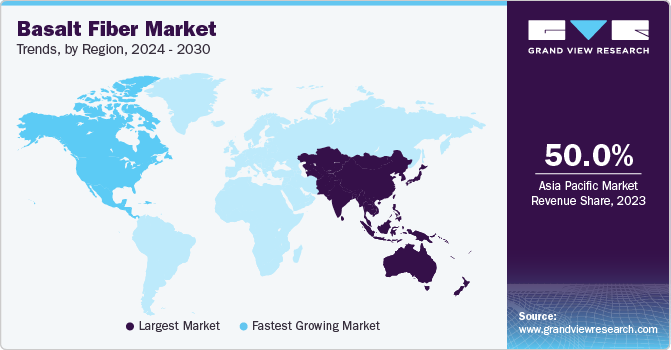
Asia Pacific Basalt Fiber Market Trends
Asia Pacific basalt fiber marketaccounted for the largest revenue share of more than 50.0% in 2023. Market growth in this region is driven by rising utilization across diverse industries, including building & construction, wind energy, automotive, and electrical & electronics. The industrial development in developing countries like China and India is boosting market growth. The construction industry is a major contributor to market growth, with the region's rapid urbanization leading to a surge in infrastructure projects requiring durable and lightweight materials like basalt fiber for reinforcement and insulation purposes. The region’s focus on renewable energy and environmental sustainability further propels demand for basalt fiber, especially in applications related to wind energy, electrical insulation, and water filtration. With favorable economic conditions, expanding industrial sectors, and increasing R&D investments, the regional market is poised for continued expansion in the years to come.
The basalt fiber market in India is witnessing steady growth and is amongst the fastest-growing economies in the APAC, which is fueled by its ambitious infrastructure development projects initiated by the government and growing emphasis on sustainable construction materials as it aims towards a sustainable future.
The Japan Basalt fiber market is characterized by a strong focus on R&D and technological advancements, driving the development of high-performance basalt fiber products tailored to meet the requirements of industries such as automotive & transportation, aerospace, manufacturing, and electronics sectors.
Central & South America Basalt Fiber Mraket Trends
The basalt fiber market in Central & South America is primarily driven by growth in Brazil’s industrial sector and increasing investments in infrastructure projects, which are contributing to market expansion. In addition, Brazil's rich basalt reserves provide a strategic advantage, ensuring a stable supply chain and favorable production costs for manufacturers operating within the region.
The Brazil basalt fiber market will witness considerable growth over the forecast period. In August 2023, the Brazilian government unveiled a substantial investment plan totaling USD 200.0 billion aimed at enhancing infrastructure, energy, and transportation projects over a period spanning 2024 to 2028. This strategic initiative is designed to stimulate economic expansion, foster job creation, and stimulate market demand.
Middle East & Africa Basalt Fiber Market Trends
The basalt fiber market in Middle East & Africa is expected to grow steadily in the coming years. Countries in this region are witnessing rapid industrialization and urbanization, which is supporting market growth. For example, the U.A.E. government plans to increase the contribution of the manufacturing industry to its economy by diversifying its investments in other industries. Furthermore, in February 2023, the U.A.E., Egypt, Jordan, and Bahrain entered into a series of industrial agreements worth USD 2.0 billion, driving demand for basalt fiber products and enhancing regional market growth.
Key Basalt Fiber Company Insights
Some of the key players operating in the market include Kamenny Vek, and MAFIC.
-
Kamenny Vek is a leading manufacturer of high-quality basalt fiber products based in Russia. With decades of experience in business, Kamenny Vek is renowned for its advanced production techniques and innovative solutions catering to various industries such as automotive, aerospace, construction, and marine
-
MAFIC with operations in Europe and North America, is a renowned manufacturer of advanced basalt fiber solutions. It specializes in high-modulus basalt fiber for aerospace and automotive applications. It has a strong R&D team and is collaborating with leading industry players
Mudanjiang Jinshi Basalt Fiber and Sudaglass Fiber Technology are some of the emerging market participants.
-
Mudanjiang Jinshi Basalt Fiber is a rising star that focuses on high-performance basalt fiber for composites and reinforcement applications. It boasts advanced production technology and is actively expanding its product portfolio
-
Sudaglass Fiber Technology, a Ukrainian manufacturer offers basalt fiber products for construction, reinforcement, and thermal insulation. It has a cost-effective production process and is targeting emerging markets in Eastern Europe and Asia
Key Basalt Fiber Companies:
The following are the leading companies in the basalt fiber market. These companies collectively hold the largest market share and dictate industry trends.
- ARMBAS
- BASTECH
- Deustche Basalt Faser GmbH
- Galen Ltd.
- INCOTELOGY GmbH
- ISOMATEX SA
- Kamenny Vek
- MAFIC
- Shanxi Basalt Fiber Technology Co., Ltd.
- Sudaglass Fiber Technology
- Technobasalt-Invest LLC
- Zhejiang GBF Basalt Fiber Co.
Recent Developments
-
In April 2022, Basaltex launched a fully recyclable surfboard in partnership with R*Concept, and Yuyo. The surfboard consists of circular epoxy, basalt fibers, and a PET core. These basalt fibers are used to develop high-performance fabrics for composites. These fabrics are unique owing to their combination of strength and impact resistance, as well as their ability to be 100% recycled by melting and drawing new fibers
-
In June 2021, Basaltex achieved a significant milestone by developing and testing a new composite material solution for railway applications. The material comprises basalt fibers with EconCore's patented honeycomb technology
Basalt Fiber Market Report Scope
Report Attribute
Details
Market size value in 2024
USD 314.9 million
Revenue forecast in 2030
USD 593.9 million
Growth rate
CAGR of 11.2% from 2024 to 2030
Base year for estimation
2023
Historical data
2018 - 2022
Forecast period
2024 - 2030
Quantitative units
Revenue in USD million, volume in kilotons, and CAGR from 2024 to 2030
Report coverage
Revenue & volume forecast, company ranking, competitive landscape, growth factors, and trends
Segments covered
Usage, end-use, region
Regional scope
North America; Europe; Asia Pacific; Central & South America; Middle East & Africa
Country scope
U.S.; Canada; Mexico; Germany; France; UK; Italy; China; Japan; India; South Korea; Brazil; Saudi Arabia; South Africa
Key companies profiled
ARMBAS, BASTECH, Deustche Basalt Faser GmbH, Galen Ltd., INCOTELOGY GmbH, ISOMATEX SA, Kamenny Vek, MAFIC, Shanxi Basalt Fiber Technology Co., Ltd., Sudaglass Fiber Technology, Technobasalt-Invest LLC, Zhejiang GBF Basalt Fiber Co.
Customization scope
Free report customization (equivalent up to 8 analysts working days) with purchase. Addition or alteration to country, regional & segment scope.
Pricing and purchase options
Avail customized purchase options to meet your exact research needs. Explore purchase options
Global Basalt Fiber Market Report Segmentation
This report forecasts revenue and volume growth at global, regional, and country levels and provides an analysis of the latest industry trends in each of the sub-segments from 2018 to 2030. For this study, Grand View Research has segmented the global basalt fiber market report based on usage, end-use, and region:
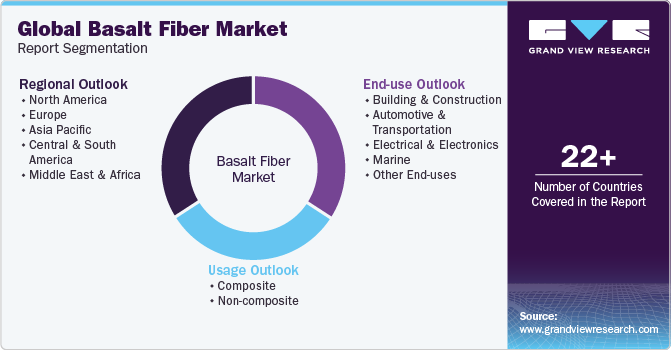
-
Usage Outlook (Volume, Kilotons; Revenue, USD Million, 2018 - 2030)
-
Composite
-
Non-composite
-
-
End-use Outlook (Volume, Kilotons; Revenue, USD Million, 2018 - 2030)
-
Building & Construction
-
Automotive & Transportation
-
Electrical & Electronics
-
Marine
-
Other End-uses
-
-
Regional Outlook (Volume, Kilotons; Revenue, USD Million, 2018 - 2030)
-
North America
-
U.S.
-
Canada
-
Mexico
-
-
Europe
-
Germany
-
UK
-
France
-
Italy
-
-
Asia Pacific
-
China
-
Japan
-
India
-
South Korea
-
-
Central & South America
-
Brazil
-
-
Middle East and Africa
-
Saudi Arabia
-
South Africa
-
-
Frequently Asked Questions About This Report
b. The global basalt fiber market was estimated at USD 284.1 million in 2023 and is expected to reach USD 314.9 million in 2024.
b. The global basalt fiber market is expected to grow at a compound annual growth rate of 11.2% from 2024 to 2030 to reach USD 593.9 million by 2030.
b. Building & Construction was the key application segment of the market with a revenue share of above 34.0% of the market in 2023.
b. Some of the key players operating in the basalt fiber market are Sudaglass Fiber Technology, Technobasalt-Invest LLC, INCOTELOGY GmbH, ISOMATEX SA, ARMBAS, BASTECH, MAFIC, and Galen Ltd.
b. Factors including the increasing demand for basalt fiber within the construction sector, attributed to its non-corrosive properties, along with its growing appeal as a sustainable alternative to plastic fiber across various industries, are significantly driving the market growth.
Share this report with your colleague or friend.
Need a Tailored Report?
Customize this report to your needs — add regions, segments, or data points, with 20% free customization.

ISO 9001:2015 & 27001:2022 Certified
We are GDPR and CCPA compliant! Your transaction & personal information is safe and secure. For more details, please read our privacy policy.
Trusted market insights - try a free sample
See how our reports are structured and why industry leaders rely on Grand View Research. Get a free sample or ask us to tailor this report to your needs.










